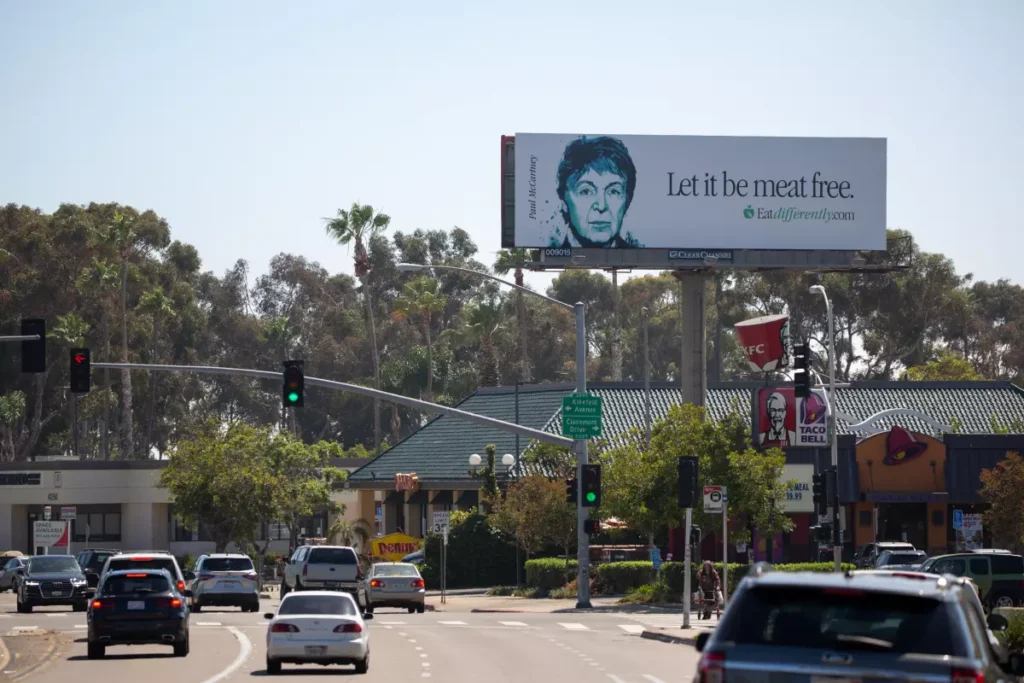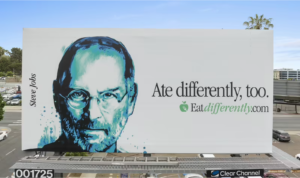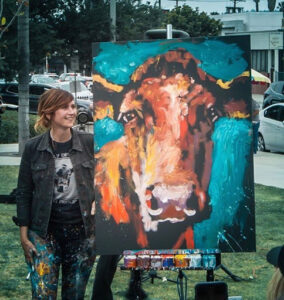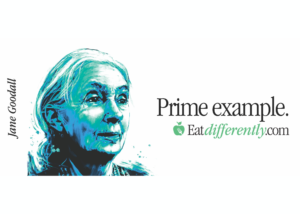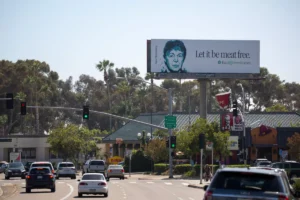This article has been written by John Wilkens and reposted from www.sandiegouniontribune.com
For more than a month, seven famous people have been staring down on San Diegans.
Cesar Chavez, Albert Einstein, Mahatma Gandhi, Jane Goodall, Steve Jobs, Paul McCartney and Greta Thunberg are featured in a billboard campaign that urges people to “eat differently.”
Differently, as in plants, not animals.
San Diego is the testing ground for the vegan-advocacy project, said Lori Amos, a publicist for Eat Differently LLC, which is a subsidiary of the non-profit Karuna Foundation.
The billboards here — 29 in all — went up in early June. Most will be in place through the end of August, with a handful remaining into early September. The campaign may go to Los Angeles, too, and will culminate with digital signs in New York City during a United Nations conference on sustainable development in September, organizers said.
Amos estimated that Eat Differently is spending “hundreds of thousands of dollars” on the billboards here.
The campaign is patterned after a famous one launched by Apple in the late 1990s that used the phrase “think different.” It, too, featured pioneers from various fields — Thomas Edison, Rosa Parks, Pablo Picasso — and applauded their willingness to upend the status quo.
“Here’s to the crazy ones,” the Apple ads said. That campaign ran for about five years.
Amos said the billboards here are a way of pointing out, “These luminaries didn’t just think differently — they eat differently, too.”
The hope is “that people in San Diego will be inspired” to think about adopting a plant-based diet, she said. Campaign organizers believe eating that way is better for the health of people and animals, and better for a planet threatened by climate change.
San Diego was chosen as the test location because it is “a vibrant city with a forward-thinking, health conscious population that understands the importance of taking steps to combat the global climate crisis facing mankind,” according to an Eat Differently press release.
The city regularly ranks among the most vegan-friendly in the U.S. A WalletHub study last fall that included such metrics as the cost of groceries and the availability of meat-less options in restaurants put San Diego ninth among the nation’s 100 largest cities. Portland was first.
The billboards are dominated by head-shot drawings of the seven famous people, done by artist and animal-welfare activist Amy Burkman. All are considered public figures and “have been vocal and/or passionate about eating a plant-forward diet,” according to the campaign.
Alongside the faces are short sentences that speak in some way to that person’s legacy.
Cesar Chavez: “His diet was equally revolutionary.”
Paul McCartney: “Let it be meat free.”
Greta Thunberg: “Tomorrow is counting on you.”
Amos said response to the campaign has been mostly favorable, as measured by comments sent to the Eat Differently website, which has information about plant-based diets and the advocacy efforts.
One person thanked the organizers for giving her hope about the future of the planet, Amos said. Another reported being inspired by the billboards to contact local school officials and ask them to make changes to cafeteria menus.
A negative comment came from someone who “took umbrage with reducing Cesar Chavez down to his diet, which was clearly not our intent,” Amos said.
Reaction elsewhere has been more divided. A City News Service story about the billboards, posted on two local news sites last month, drew comments that ranged from “Great idea!” to “Perhaps you vegetarian zealots, who are among the most annoying people in the universe, should just simply mind your own business and eat plants if that’s what you want to do.”
Billboards have a long history of being provocative — that’s one of the ways they get people to read them. San Diego has had its share of controversies, including one sign that went up downtown in 1989 criticizing the city’s failure to provide a memorial to slain civil rights leader Dr. Martin Luther King Jr.
“Welcome to America’s Finest a) city; b) tourist plantation; c) Convention Center,” the sign read.
Ten years later, another billboard sparked alarm but turned out to be a radio stunt. “Sell Your Baby,” it read, with a phone number that connected callers to something called Exchange International.
In some ways, San Diego is a surprising choice for a new billboard campaign, given the city’s documented distaste for what it calls “visual clutter.”
In 1972, the city passed an ordinance that banned virtually all outdoor advertising. Billboard companies took the legal fight to the U.S. Supreme Court, which struck down the law as an unconstitutional infringement of free speech.
The ruling forced the city to adopt revised regulations that keep in place existing billboards — there are less than 600 now — but restrict new ones based on community aesthetics and traffic safety.
As a result, San Diego is considered a model for other communities trying to limit the use of billboards.

